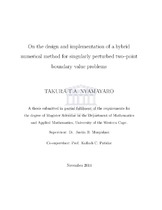| dc.contributor.advisor | Munyakazi, Justin B. | |
| dc.contributor.advisor | Patidar, Kailash C. | |
| dc.contributor.author | Nyamayaro, Takura T. A. | |
| dc.date.accessioned | 2015-07-28T12:41:00Z | |
| dc.date.available | 2015-07-28T12:41:00Z | |
| dc.date.issued | 2014 | |
| dc.identifier.uri | http://hdl.handle.net/11394/4326 | |
| dc.description | >Magister Scientiae - MSc | en_US |
| dc.description.abstract | With the development of technology seen in the last few decades, numerous solvers have been developed to provide adequate solutions to the problems that model different aspects of science and engineering. Quite often, these solvers are tailor-made for specific classes of problems. Therefore, more of such must be developed to accompany the growing need for mathematical models that help in the understanding of the contemporary world. This thesis treats two point boundary value singularly perturbed problems. The solution to this type of problem undergoes steep changes in narrow regions (called boundary or internal layer regions) thus rendering the classical numerical procedures inappropriate. To this end, robust numerical methods such as finite difference methods, in particular fitted mesh and fitted operator methods have extensively been used. While the former consists of transforming the continuous problem into a discrete one on a non-uniform mesh, the latter involves a special discretisation of the problem on a uniform mesh and are known to be more accurate. Both classes of methods are suitably designed to accommodate the rapid change(s) in the solution. Quite often, finite difference methods on piece-wise uniform meshes (of Shishkin-type) are adopted. However, methods based on such non-uniform meshes, though layer-resolving, are not easily extendable to higher dimensions. This work aims at investigating the possibility of capitalising on the advantages of both fitted mesh and fitted operator methods. Theoretical results are confirmed by extensive numerical simulations. | en_US |
| dc.language.iso | en | en_US |
| dc.publisher | University of the Western Cape | en_US |
| dc.subject | Singular perturbation problems | en_US |
| dc.subject | Higher order numerical methods | en_US |
| dc.subject | Convergence Analysis | en_US |
| dc.title | On the design and implementation of a hybrid numerical method for singularly perturbed two-point boundary value problems | en_US |
| dc.rights.holder | University of the Western Cape | en_US |

